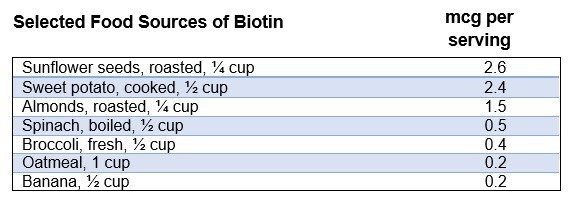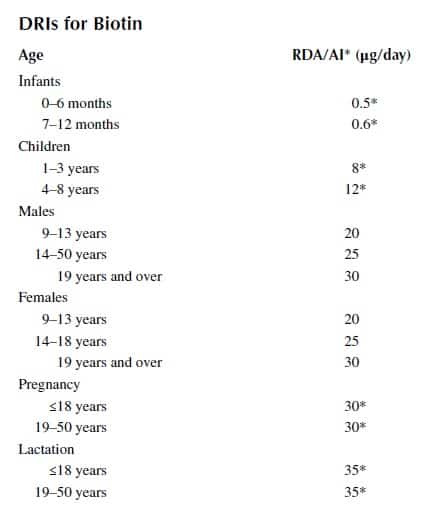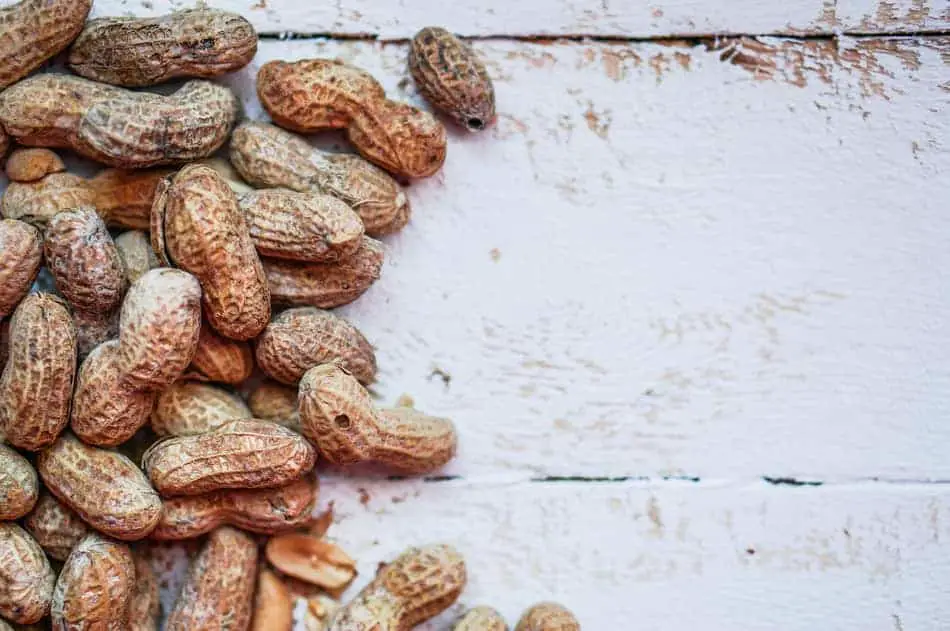What we’ll do here is cover some basic information about biotin or vitamin B7 as relates to the vegan diet.
First, I’ll answer some common questions for those of you who are in a rush:
- Is biotin vegan? Yes, unlike B12 and (check out the article here), biotin is found in a number of plant foods (albeit in small amounts).1 As for supplements, biotin can be derived from animals but tends to be produced via chemical synthesis.16 So, it’s typically considered vegan.
- What vegan foods are good sources of biotin? Common plant-based sources of biotin include peanuts, sunflower seeds, sweet potatoes, and almonds.1 (See the chart below for more examples)
- Are vegans commonly deficient in biotin? No, not characteristically. According to NIH, those at risk for biotin deficiency include individuals with biotinidase deficiency, chronic alcohol exposure, and breastfeeding women.1
- What is vegan biotin? Vegan biotin is simply biotin not derived from animal sources. Biotin, typically sold for hair growth, is sometimes marketed this way. If the supplement isn’t labeled as vegan, you may want to contact the manufacturer to ensure that the vitamin isn’t of animal origin.
What we’ll do next is take look at some of the basic information about this vitamin, including sources, functions, and deficiency symptoms.
Overview and Functions
Believe it or not, there used to be a syndrome known as “egg white injury.” In the olden days, it was observed (by W.G. Bateman initially) that a diet high in egg whites would often induce certain toxic symptoms in humans and other animals.2
A bit later on in 1927, Margaret Averil Boas found that a diet consisting only of egg whites would cause a number of symptoms in rats including alopecia (hair loss), dermatitis, and loss of muscular coordination in rats. She coined it “egg white injury.”3As a remedy for these debilitating symptoms, a guy named Paul Gyorgy discovered a protecting factor, what he called vitamin H.4
Researchers working independently of each other went on to discover the vitamin in various contexts.5,6 Finally, in 1940, Györgyi managed to prove that the coenzyme, vitamin H and bios were all actually the same substance. He named the substance biotin.7Biotin carries out a number of functions in cells as a coenzyme. Additionally, biotin serves a few non-coenzyme roles including possible functions in gene expression and cell proliferation.
Coenzyme Functions
Krebs Cycle and Gluconeogenesis
Biotin is a coenzyme for pyruvate carboxylase, a mitochondrial enzyme, which converts pyruvate to oxaloacetate. If the cell is lacking ATP, then oxaloacetate enters the Krebs for energy production. However, if the cell has more ATP than it knows what to do with, then oxaloacetate is used for gluconeogenesis—the process by which protein is used to make glucose.8
Fatty Acid Synthesis
By serving as a coenzyme for acetyl-CoA carboxylase, biotin helps initiate the synthesis of fatty acids by converting acetyl-CoA to malonyl-CoA.8
Metabolism of Odd-Numbered Fatty Acids and Certain AAs
Propionyl-CoA carboxylase, a mitochondrial enzyme, uses biotin to break down isoleucine, methionine, and threonine all of which generate propionyl-CoA. Biotin and propionyl-CoA carboxylase also break down odd-numbered-chain fatty acids which also forms propionyl-CoA.8
Catabolism of the AA Leucine
Biotin, along with the enzyme β-methylcrotonyl-CoA carboxylase, play an important role in the breakdown of the amino acid leucine in a series of reactions that ultimately generate acetoacetate and acetyl-CoA.8
Vegan Sources of Biotin
Biotin is actually made by intestinal bacteria inhabiting our colons. It’s just not made in sufficient quantities. Luckily, it’s fairly widely distributed in food, and there are several plant sources.
It’s nowhere near as abundant in plant foods compared to other B vitamins, but it’s found widely enough so that, along with what our bodies make naturally, deficiency isn’t a common problem amongst vegetarians and vegans. The Daily Value (DV) for biotin is 30μg. In many foods, biotin is found as either biocytin (bound to the AA lysine) or biocytin (biotin bound covalently to protein).
I hope you like peanuts because they’re about the only semi-concentrated plant source of biotin.
Some of the better plant of sources of biotin include:9
- Nuts—there are about 4.9 μg/serving and 1.3 μg/serving for peanuts and almonds, respectively. That comes to about 16% DV for peanuts and 4.3% DV for almonds.
- Orange juice—OJ has about 1.22 μg/serving or 4% DV.
- Sweet potato—about 1.16 μg/serving or 3.8% DV.
- Mushrooms, canned—2.59 μg or 8.6% DV. Tangentially, mushrooms are also a rare plant-based source of vitamin D.
Select Vegan Sources of B7

You probably noticed that the DV is missing in the above chart. That’s because biotin actually doesn’t have a DV currently. It will finally be receiving a DV of 30 mcg (the value used above) for adults and children 4 years of age and older when the updated Nutrition and Supplement Facts labels are implemented.10
The updated DVs and labels will appear on food products and supplements starting in January 2020, but can be used now.11
Like the other B vitamins, the FDA doesn’t require food labels to list biotin unless a food product has been fortified with it. Foods that provide at least 20% of the DV are considered high sources of biotin, but foods providing lesser amounts also contribute to a healthy diet.”
Vegan Needs (Adequate Intake)
Bioavailability isn’t a big issue for this nutrient, so needs for vegans are no different than the rest of the population.
The Adequate Intake (AI) for biotin is 30 μg/day for adult men and women.13 Needs go up a bit for lactation increasing to 35 μg/day.13

Source: Micronutrients in Health and Disease. Kedar Prasad – Crc – 2011
Deficiency Symptoms
I described some of the symptoms in the intro to this article. It was initially called egg white injury due to a substance known as avidin—a glycoprotein found in raw egg whites.
Avidin irreversibly binds to biotin in the tightest noncovalent bond found in nature thus far. The strong bond prevents biotin from absorbing. Because avidin isn’t heat-stable, cooking it solves the problem. Or just avoiding the consumption of eggs.
To summarize, neurologic symptoms linked to biotin deficiency include:15
- Lethargy
- Depression
- Paresthesia in extremities (an odd sensation that feels like numbness/pins and needles.
- Reduced muscle tone (hypotonia)
- Hallucinations
Other symptoms include:15
- A red, scaly dermatitis around the eyes, mouth, and nose. A symptom shared by riboflavin, niacin, and B6 deficiencies.
- Anorexia and nausea
- Alopecia (hair loss)
- Muscle pain may occur
- Death if untreated
Aside from drinking too many eggs, impaired biotin absorption can occur with certain GI disorders such as IBD. Chronic, excessive consumption of alcohol can also decrease absorption.
The Vegan Diet and Biotin Status
Thankfully, biotin status in vegans (and those following other plant-based diets) tends to be adequate. This isn’t a given considering that all biotin-dense food sources are of animal origin. I had to dig pretty deep to come up with just a few plant foods that provide over 10% of the DV of 30 mcg. But, because some (albeit limited) biotin is synthesized by our intestinal bacteria, biotin deficiency in humans tends to be rare.
One study looked at the biotin status of vegans, measuring plasma levels and urinary excretion of biotin in adults and kids adhering to one of three self-selected diets:
- Strict vegetarian (vegan)
- Lacto-ovo-vegetarian
- Mixed diet (meat and dairy products plus plant-derived foods).
The trend “vegan greater than lactoovovegetarian greater than mixed” was detected in the plasma concentrations of biotin in both adults and children and the differences generally fell short of statistical significance.14The author concluded, “These observations provide evidence that the biotin nutritional status of vegans is not impaired.”14
References
- Office Of Dietary Supplements – Biotin https://ods.od.nih.gov/factsheets/Biotin-HealthProfessional/
- Bateman, W.G. (June 1916). “The Digestibility and Utilization of Egg Proteins”. Journal of Biological Chemistry. 26: 263–291.
- Boas, Margaret (1927). “The effect of desiccation on the nutrient value of the protein”. Biochemical Journal. 21: 712–724.
- Gyorgy, Paul (December 1939). “The Curative Factor (vitamin H) for Egg White Injury, with Particular Reference to Its Presence in Different Foodstuffs and in Yeast”. Journal of Biological Chemistry. 131: 733–744
- Kögl and Tönnis (1936). “Ueber das Bios Problem. Darstellung von kristallisiertem Bios aus Eigelb”. Zschr. f. Phys. Chem. 242: 43.
- West PM, Wilson PW (June 1939). “The Relation of “coenzyme R” to Biotin”. Science. 89 (2322): 607–8.
- György P, Rose CS, Eakin RE, Snell EE, Williams RJ (May 1941). “Egg-White Injury as the Result of Nonabsorption or Inactivation of Biotin”. Science. 93 (2420): 477–8.
- Knowles J. The mechanism of biotin-dependent enzymes. Ann Rev Biochem. 1989; 58:195–221.
- Staggs CG, Sealey WM, McCabe BJ, et al. Determination of the biotin content of select foods using accurate and sensitive HPLC/avidin binding. J Food Compost Anal. 2004; 17:767–76.
- U.S. Food and Drug Administration. Food Labeling: Revision of the Nutrition and Supplement Facts Labels.external link disclaimer 2016
- U.S. Food and Drug Administration. Food Labeling: Revision of the Nutrition and Supplement Facts Labels and Serving Sizes of Foods That Can Reasonably Be Consumed at One Eating Occasion; Dual-Column Labeling; Updating, Modifying, and Establishing Certain Reference Amounts Customarily Consumed; Serving Size for Breath Mints; and Technical Amendments; Proposed Extension of Compliance Datesexternal link disclaimer. 2017.
- U.S. Department of Agriculture, Agricultural Research Service. USDA National Nutrient Database for Standard Reference, Release 27. Nutrient Data Laboratory Home Page, 2014.
- Food and Nutrition Board. Dietary Reference Intakes for Thiamin, Riboflavin, Niacin, Vitamin B6, Folate, Vitamin B12, Pantothenic Acid, Biotin, and Choline. Washington, DC: National Academy Press. 1998 pp. 374–89.
- Lombard KA, Mock DM. Biotin nutritional status of vegans, lactoovovegetarians, and nonvegetarians. Am J Clin Nutr. 1989 Sep;50(3):486-90.
- Gropper, Sareen S.; Smith, Jack L.. Advanced Nutrition and Human Metabolism (Page 343).
- Jose L. Revuelta, Ruben M. Buey, Rodrigo Ledesma‐Amaro, and Erick J. Microbial biotechnology for the synthesis of (pro)vitamins, biopigments and antioxidants: challenges and opportunities. Microb Biotechnol. 2016 Sep; 9(5): 564–567.


